—-
To stay in the loop with the latest features, news and interviews from the creative community around licensing, sign up to our weekly newsletter here
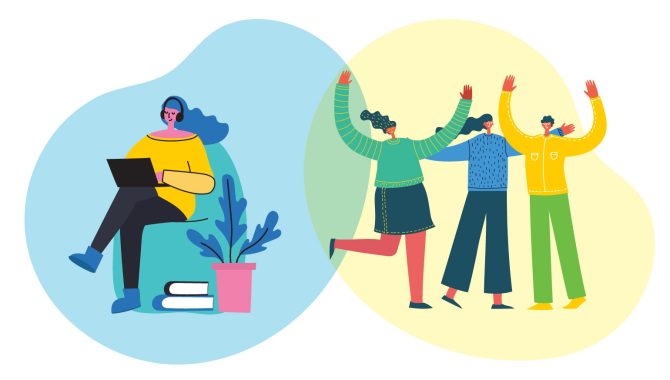
Do typical traits of introverts and extraverts make one better suited to working as a creative in the licensing industry? We asked figures across the brand extension space for their thoughts.
 Oliver Dyer, MD, Skew
Oliver Dyer, MD, Skew
If you’re in an introvert that’s been pigeonholed as a shy people-hating bookworm, the next time someone – let’s face it, some blowhard extravert, probably a guy – hints at that, smile politely and give them the finger from me. The creative industry needs all sorts. Introversion is about where you get your energy and how you process information, not a measure of how gregarious you are.
My one blind spot around this has been to do with sales. I fully signed up to the ridiculous misconception of new business meaning I had to be the ‘smile and dial’ extravert that gets their energy from working a room. In other words, pretending to be someone I’m not.
But not even sales is off limits to introverts, let alone creative – which is a more stereotypically less social skill. I was aware of the premise of consultative sales and new business but hadn’t internalised it. New business, it turns out, is a series of one-to-one conversations… A genuine process of curiosity with problem solving as the goal.
I thrive on conversations of substance; on getting deep into problems to try and walk in a client’s shoes. With real understanding, I can either offer something of genuine value, or I can direct my client elsewhere and we’ll share another conversation another day.
This is squarely in an introvert’s wheelhouse. There’s no aspect of creativity that introverts can’t shine in when we play to our strengths instead of being defined by others.
 Stephanie Griggs, Creative Director, Studio Griggs
Stephanie Griggs, Creative Director, Studio Griggs
I say work with what you’ve got!
If you’re more of an extravert, then face-to-face meetings, presentations and networking events – which still sort of feels like a novelty, after covid – is more likely to be your preferred way of talking shop. If you’re introverted, the thought of these might make your palms a bit clammy.
Either way, I believe soft skills are the most important aspects of relationship building; good communication, willingness to collaborate, empathy and active listening go miles on the road to succeeding in the industry… And as creatives, one of the most powerful ways we can show this is through our work.
Personally, I’m an extraverted introvert. I need balance. I really like solo working, but my creativity is probably most prevalent when I’m engaging with my creative peers face-to-face. I’m always amazed at what can come from organic introductions and conversations. These happen much more commonly when putting yourself ‘out there’ in some capacity. Take BLE for example. It’s a great event in bringing together introverts, extraverts and all manner of blends together in one room – I would encourage all to go along.
Your creativity is your super power, so whether you showcase this best via an extraverted TED talk style presentation, or a masterfully annotated emailed document – do it your own way!
 Danny Heffer, Creative Lead, Aardman Animations
Danny Heffer, Creative Lead, Aardman Animations
There are two areas where it comes to bear… Firstly, we can look at our careers and path through the industry. Naturally, I’m quite introverted and find it difficult to holler and shout about successes and get recognition – it’s hard, isn’t it? It can be a real cheek burner to put your head above the parapet – not those kinds of cheeks! So I’ve found it a hindrance, and always have, throughout my career.
Secondly, we can look at our work as creatives. I strongly believe it’s all about designing to the audience or consumer. Being able to understand that person relies on an empathic interpretation of what they want… I feel that being introverted helps that. I like to get my head into that persona – watching, observing, soaking up their world. I think being an extravert in that situation could skew it… Quiet, thoughtful, searching for insight; all of those are introverted traits. So there’s a positive side too.
I guess I’m saying a balance is good if you can manage that.
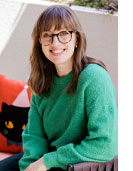 Julia Broughton, Director, Scatterbrain Studios
Julia Broughton, Director, Scatterbrain Studios
Being an introvert has definitely helped me as a creative. So much of the business journey involves keeping your head down and getting the work done. If, like me, you’ve created a brand by yourself, you have to be happy to spend hours, days, weeks – years even! – working by yourself and keeping yourself accountable. I like being by myself, so this hasn’t been a challenge. In fact, it stops me getting distracted!
Being an introvert doesn’t mean I’m shy though – that’s a common misconception. Spending so much time working alone means my social battery is fully charged when it’s time to go out and shout about my business alongside my agents!
 Sharon Weisman, CEO, PowerStation Studios US
Sharon Weisman, CEO, PowerStation Studios US
In recognising the diverse talents within our industry, I think there is a crucial opportunity for enhancement in the way we conduct client meetings and tradeshows. Traditionally, these engagements have primarily involved our dynamic licensing and salespeople; the front-facing champions of our enterprise… And yes, there are usually extraverts – or they fake it really well!
However, I believe in the power of inclusivity and the magic that comes from every voice at the table. Our creative professionals are the visionaries who transform client needs into tangible solutions. While they may often be more introspective, their insight is invaluable for capturing the essence of a client’s vision.
We believe the industry should be pioneering a new approach, where cross-functional collaboration is the norm. By integrating our creatives directly into client interactions, we bridge any disconnect and ensure that nothing is ‘lost in translation’. This inclusive strategy harnesses the collective ‘brain’ of our agency, ensuring we deliver outcomes that are as effective as they are inspired.
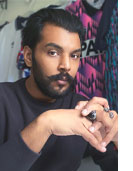 Rav Kiran, Men’s Lead Designer, Outerstuff
Rav Kiran, Men’s Lead Designer, Outerstuff
Everybody is different – and even more so when it comes to the creative mindset itself. We tend to think of introverts as those who like to be alone, whereas extraverts are more sociable and outgoing… That said, I feel an introvert can be very outgoing and extraverts also require moments of isolation and focus. The big difference between the two is actually the environments they thrive in.
When in the right environment, introverts can be uniquely creative in a way that extraverts can’t and vice versa – and no one can be branded one or the other completely.
I myself am considered a combination of the two – the ambivert. An ambivert is a more balanced combination of both the introvert and the extravert. You could say that they possess both personality types’ strengths and weaknesses, but – depending on the situation – are able to channel either option. In business, this is extremely useful. An employee who is just as able to handle large social situations as well as dealing with low-key methodical work is a great advantage.
While introverted minds might find it harder to work in a group, and extraverted minds might struggle working in silence, both are able to overcome their natural instincts in order to complete a task. A brilliant designer – or any other type of creative – knows when to be open-minded and step outside of their comfort zone.
It’s important to remember that you’re only ever as flawed as you let yourself believe.
 Sophie Bloomfield, Creative Director & CEO, SBC
Sophie Bloomfield, Creative Director & CEO, SBC
It’s good to have personality in this industry. That’s probably more important than being introvert or extravert as everyone’s got a unique mix of both. Having managed teams of designers – as well as working with freelancers and agencies – you notice one thing… Great ideas come from designers that feel supported, nurtured and comfortable to explore ideas.
No idea is bad; there are just some that are more commercial. All ideas are welcome – that’s what I tried to instil in my team. Feeling empowered is what’s key for all creatives.
 Ben Cox, Creative Director & Co-Founder, Fraktal
Ben Cox, Creative Director & Co-Founder, Fraktal
All personalities have their place in a company; the key aspect is that they are used to their full potential – and in the right positions. For example, an extravert might work better in a marketing role where a forthcoming, outgoing personality is beneficial in engaging with clients and partners. An introvert can bring value by having a focus on work and being thoughtful in their decision-making. Each can enhance and temper the strengths and weaknesses of each other respectively by balancing the other out. Embracing both can lead to a more diverse, well-rounded, successful company.
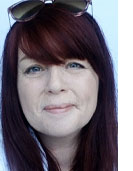 Sarah Lawrence, Licensing Director, This is Iris
Sarah Lawrence, Licensing Director, This is Iris
Being approachable, respectful and making sure you’re on top of the many changes that take place within our colourful industry is key to building relationship with partners, colleagues and buyers – all of whom are constantly under pressure to launch the ‘next big thing’.
Does being an introvert or an extrovert help – or hinder – things? I’d say this doesn’t come into play if you are representing a credible show or collection that fits the criteria being searched for by the licensee or retailer. And this works both ways. If those decision makers are doing their jobs properly, they’ll be listening to the ever-changing needs of the consumer and be out in the market looking for the right IP.
There are some big personalities in every industry but, in ours, does that equal a licensing success? There are fantastic people who are quieter, work just as hard and are just as creative and passionate about how they deliver great stories and programs to the customer. They’re also just as good at investing in building all-important long-term relationships.
Now, these people may not shout the loudest, but if the right conversations are taking place and the quality of the collection or IP is there, surely this should lead to the success of each program?
More now than ever we should be aware of the amazing creatives working within our industry and be open to new conversations and building new relationships… There is so much more available to this industry if we took a little time to look beyond the usual routes to market.
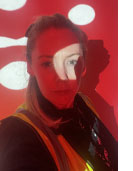 Ciara Glynn, Head of Creative, The Department
Ciara Glynn, Head of Creative, The Department
I believe that a combination of traits from both personalities can be highly beneficial as a creative. Yes, you could say being a strong-minded loud extravert will get you places in the industry as a creative, while the pensive silent creative could produce genius work without the fanfare. Ultimately, a blend of both is the ideal.
Good creative work requires observation, listening, taking it all in and noticing things others don’t. Introverts tend to be reflective and introspective, which can enhance creativity. This means they might excel at generating innovative ideas and solutions by spending time in thoughtful contemplation. But you do need to sell these ideas – which is where the extravert qualities come in… Strong relationship-building and brilliant communication skills are crucial aspects of the licensing industry. Networking with potential partners, clients, and collaborators are real factors in success – and ones that I personally hate, but I try to channel my inner extravert!
In delivering work, introverts pay close attention to detail and thrive in tasks that require precision, such as contract negotiations and responding to a brief. This is something that extraverted creatives might struggle with a little as they develop creative, love it and dream big without necessarily dwelling on the smaller details. Something I do daily to rein in my strong-willed creative directors!
In all, versatility and a diverse skill set is what can bring you success as a creative. Individuals who can own a blend of introverted and extraverted characteristics may find themselves well-equipped for the challenges in the licensing industry.
Enter your details to receive Brands Untapped updates & news.